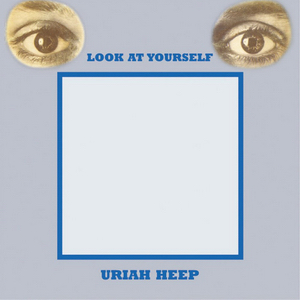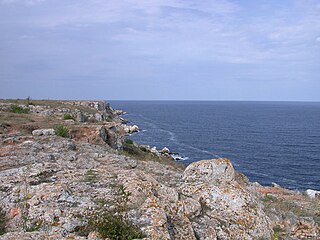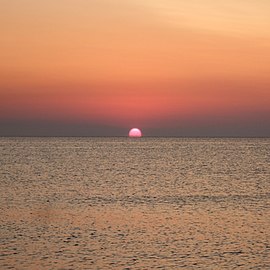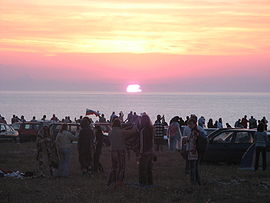
May Day is a European festival of ancient origins marking the beginning of summer, usually celebrated on 1 May, around halfway between the Northern Hemisphere's Spring equinox and June solstice. Festivities may also be held the night before, known as May Eve. Traditions often include gathering wildflowers and green branches, weaving floral garlands, crowning a May Queen, and setting up a Maypole, May Tree or May Bush, around which people dance and sing. Bonfires are also a major part of the festival in some regions. Regional varieties and related traditions include Walpurgis Night in central and northern Europe, the Gaelic festival Beltane, the Welsh festival Calan Mai, and May devotions to the Blessed Virgin Mary. It has also been associated with the ancient Roman festival Floralia.

A hippie, also spelled hippy, especially in British English, is someone associated with the counterculture of the 1960s, originally a youth movement that began in the United States during or around 1964 and spread to different countries around the world. The word hippie came from hipster and was used to describe beatniks who moved into New York City's Greenwich Village, San Francisco's Haight-Ashbury district, and Chicago's Old Town community. The term hippie was used in print by San Francisco writer Michael Fallon, helping popularize use of the term in the media, although the tag was seen elsewhere earlier.
Tourism in Bulgaria is a significant contributor to the country's economy. Situated at the crossroads of the East and West, Bulgaria has been home to many civilizations: Thracians, Greeks, Romans, Eastern Romans or Byzantines, Slavs, Bulgars, and Ottomans. The country is rich in tourist sights and historical artifacts, scattered through a relatively small and easily accessible territory. Bulgaria is internationally known for its seaside and winter resorts.

Varna is the third-largest city in Bulgaria and the largest city and seaside resort on the Bulgarian Black Sea Coast and in the Northern Bulgaria region. Situated strategically in the Gulf of Varna, the city has been a major economic, social and cultural centre for almost three millennia. Historically known as Odessos, Varna developed from a Thracian seaside settlement to a major seaport on the Black Sea.

A subculture is a group of people within a cultural society that differentiates itself from the conservative and standard values to which it belongs, often maintaining some of its founding principles. Subcultures develop their own norms and values regarding cultural, political, and sexual matters. Subcultures are part of society while keeping their specific characteristics intact. Examples of subcultures include BDSM, hippies, hipsters, goths, steampunks, bikers, punks, skinheads, gopnik, hip-hoppers, metalheads, cosplayers, otaku, otherkin, furries, hackers and more. The concept of subcultures was developed in sociology and cultural studies. Subcultures differ from countercultures.

Uriah Heep are an English rock band formed in London in 1969. Their current lineup consists of guitarist Mick Box, keyboardist Phil Lanzon, lead vocalist Bernie Shaw, drummer Russell Gilbrook, and bassist Dave Rimmer. They have experienced numerous lineup changes throughout their 55-year career, leaving Box as the only remaining original member. Notable former members of the band are vocalists David Byron, John Lawton, John Sloman, and Peter Goalby; bassists Gary Thain, Trevor Bolder, John Wetton, Bob Daisley, Paul Newton, and John Jowitt; drummers Nigel Olsson, Iain Clark, Lee Kerslake, and Chris Slade; and keyboardists Ken Hensley, Gregg Dechert, and John Sinclair.

Midsummer is a celebration of the season of summer, taking place on or near the date of the summer solstice in the Northern Hemisphere; the longest day of the year. The name "midsummer" mainly refers to summer solstice festivals of European origin, especially those in the Nordic countries. In these cultures it is traditionally regarded as the middle of summer, with the season beginning on May Day. Although the summer solstice falls on 20, 21 or 22 June in the Northern Hemisphere, it was traditionally reckoned to fall on 23–24 June in much of Europe. In Christian tradition, these dates coincide with Saint John's Eve and Saint John's Day. It is usually celebrated with outdoor gatherings that include bonfires and feasting.
The 20th century saw the rise and fall of many subcultures.

David Garrick, better known by his stage name David Byron, was a British singer, who was best known in the early 1970s as the original lead vocalist of the rock band Uriah Heep. Byron possessed a powerful operatic voice and a flamboyant stage presence.

John Cooper Lawton was a British rock and blues vocalist best known for his work with Lucifer's Friend, Uriah Heep and the Les Humphries Singers.

The Bulgarian Black Sea Coast, also known as the Bulgarian Riviera, covers the entire eastern bound of Bulgaria stretching from the Romanian Black Sea resorts in the north to European Turkey in the south, along 378 km of coastline. White and golden sandy beaches occupy approximately 130 km of the 378 km long coast. The region is an important center of tourism during the summer season (May–October), drawing millions of foreign and local tourists alike and constituting one of the country's most popular tourist destinations. Prior to 1989 the Bulgarian Black Sea coast was internationally known as the Red Riviera. Since the fall of the Iron Curtain, however, its nickname has been changed to the Bulgarian Riviera.

George's Day in Spring, or Saint George's Day, is a Slavic religious holiday, the feast of Saint George celebrated on 23 April by the Julian calendar. In Croatia and Slovenia, the Roman Catholic version of Saint George's Day, Jurjevo is celebrated on 23 April by the Gregorian calendar.

Look at Yourself is the third studio album by English rock band Uriah Heep, released in September 1971 by Bronze Records in the UK and Mercury Records in the US. It was the last Uriah Heep album to feature founding member and bassist Paul Newton.

Bernard Shaw is a Canadian-English singer, and since 1986, the lead vocalist of British rock band Uriah Heep.

Shabla is a town and seaside resort in northeastern Bulgaria, administrative centre of the Shabla Municipality part of Dobrich Province. Shabla municipality includes the following villages: Bojanovo, Chernomortsi, Durankulak, Ezerets, Gorichane, Gorun, Granichar, Krapets, Prolez, Smin, Staevtsi, Tvarditsa, Tyulenovo, Vaklino, and Zahari Stoyanovo. As of December 2009, the town itself had a population of 3,586 inhabitants. It is situated on the Bulgarian Black Sea Coast in the vicinity of the salt-water Lake Shabla and Bulgaria's easternmost point, Cape Shabla.

Tyulenovo is a village and seaside resort on the north Bulgarian Black Sea Coast, part of Shabla Municipality, Dobrich Province.
The hippie subculture began its development as a youth movement in the United States during the early 1960s and then developed around the world.

"July Morning" is a song by the English rock band Uriah Heep. It is the third track on their 1971 album Look at Yourself.

Kamen Bryag is a village in northeastern Bulgaria.
Saskia Tomkins is a British musician and actress, living since 2007 in Ontario, Canada. She plays the violin, viola, cello and Nyckelharpa. She performs and records in several genres, including traditional, modern, jazz and classical music.
















